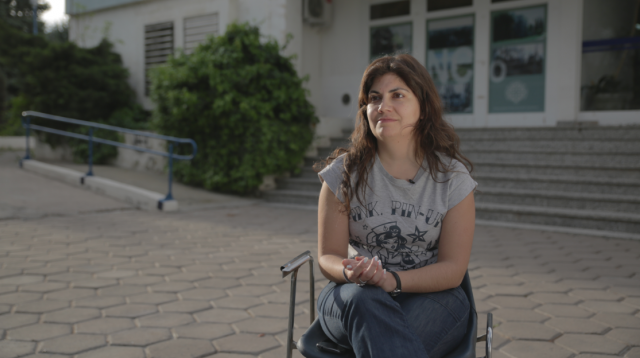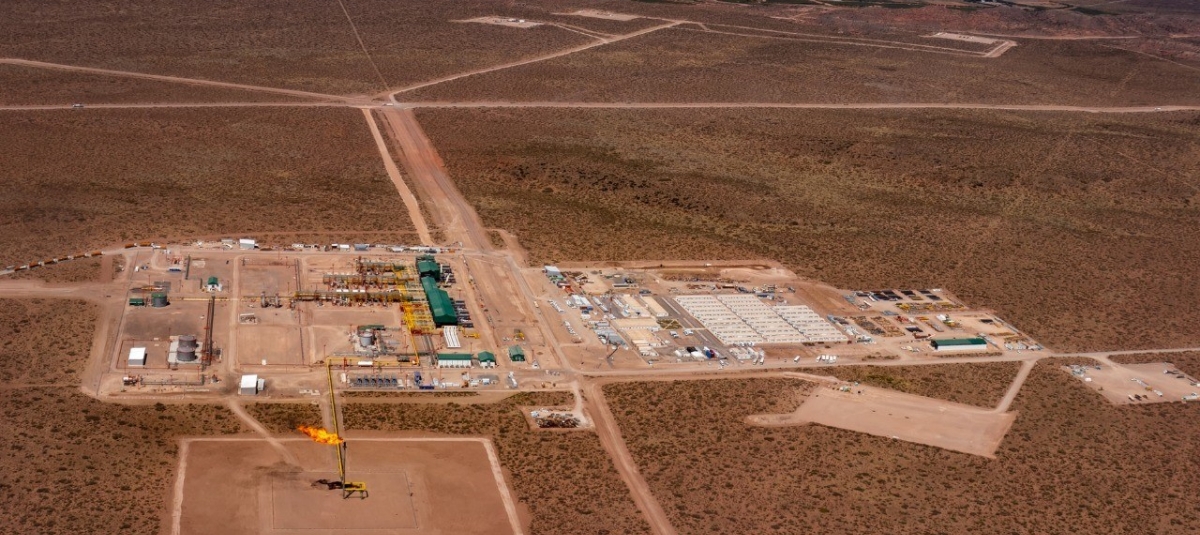The drilling of shale oil and gas happens through fracking, a technique associated with large negative impacts on the environment. The expansion of the petroleum industry in Vaca Muerta, in which also the Norwegian state-owned petroleum company, Equinor, is heavily invested, is putting increasing pressure on the environment, workers and the people living in the area. Air and water pollution pose a serious threat to the inhabitants' health. Additionally, Local communities and the Indigenous population are left with contaminated surroundings and few economic alternatives. Their original socio-economical activities and traditional livelihoods, such as fruit production and collection, horticulture, and livestock are disturbed by gas and oil activity in the area. Even when the production of hydroelectric and fossil energy has been happening in the area for many years, it has been the recent irruption of shale oil and gas that has created a deeper concern in the population regarding the future of their livelihoods and the environment of the region. In this interview, Lorena Riffo, researcher at the National University of Comahue, is elaborating on the problematic environmental and social aspects of fracking in Northern Patagonia.
The interview took place at the webinar “Olje i Patagonia: Konsekvenser for folk og miljø” , an international seminar organized by LAG Tromsø and United Nations Association of Norway in collaboration with UiT The Artic University of Norway. You can see the webinar here.
Interview with Lorena Riffo

Lorena Riffo. Foto: Felipe Gutierrez Rios, opsur.org.ar
What is fracking?
Well, hydraulic fracturing, hydrofracking or fracking are different terms for naming two types of drilling. Vertical drilling, typical for extracting hydrocarbons, and horizontal, which allows a higher profitability of the extraction, I mean, horizontal drilling is not necessary, but it's more profitable. While these drillings are taking place, they add a pipe, so to speak, through which water is injected with sand and chemicals at high pressure in order to break rocks or tight sands, depending on where the hydrocarbon is located. When the rock is broken the hydrocarbon flows through that pipe, water pressure goes up allowing the resource to be extracted. For that reason, another consequence of fracking is water pollution, because this piping is not always perfect, and there is no way of us knowing what's happening at 3000mt below the surface when the fracture is made.
How was fracking introduced to Argentina?
Argentina had the first state-administered oil company in Latin America in 1922. However, that company was sold in the 90's, in the middle of a process of privatization. Under that context, foreign companies started to become more prominent in the hydrocarbon market and started to export hydrocarbons, oil or gas, without being subject to state control. Therefore, those reservoirs that were developed by YPF, Fiscal Oilfields during an entire century came into Repsol's ownership in the 90’s. These reservoirs, developed by YPF, were depleted and by 2010-2011 this started a crisis that led to the necessity of importing gas, especially for Argentina’s domestic supply. Electric energy in Argentina is mostly generated by burning gas. Gas is also used for heating a large percentage of the housing at a national level. Not everybody has gas, but most houses do. So, in order to supply this domestic market, gas needs to be purchased from abroad. This led to a flight of capital, and the national government, at the time led by Cristina Fernandez, after trying other public policies, decided to expropriate the majority of the shares that Repsol had in YPF. This was carried out under a law called National Law of Hydrocarbon Sovereignty, and the possibility of extracting unconventional hydrocarbons started to be explored. At that very moment, instead of basing that unconventional development in local techniques, technological packages from abroad were imported. As the USA was the country with the most unconventional drillings, the Chevron-YPF agreement was signed and ratified by the Provincial Legislature of Neuquén as required by legal requirements in August 2013.
What are the consequences of fracking?
Consequences of unconventional exploitation are multiple and varied. According to research made in the USA, which is the most drilled location, different consequences are named such as health consequences in oil workers and population's health. For example, due to silica sand movement, people inhale sands which brings them breathing problems. In a more local context, we can already see that since 2013, the year when the massive extraction started, until today; we're talking about 8 years, and we're already noticing seismic activity that was previously unnoticeable or inexistent. In fact, at the beginning of 2020, before the lockdown started, an earthquake was felt in Neuquen, which is located at approximately 100 km from the drilling location and Sauzal Bonito, a village with the highest seismic activity, whose inhabitants have been reporting this issue for many years. Another consequence that affects the environment is the existence of oil dumps, as the residues of the exploitation of unconventional hydrocarbons is much higher than the exploitation of conventional hydrocarbons, and there is no treatment for it.
What are the social conflicts surrounding hydrocarbon extraction in Northern Patagonia?
This activity brought a lot of conflict because of the known consequences of conventional exploitation, and those that were started to be seen with unconventional exploitation. The most involved in these conflicts are in Neuquen, the Mapuche Confederation, which is an organization of Mapuche indigenous communities. One of these communities is located in Campo Maripe, in the middle of the Chevron-YPF agreement. As the activity started to develop, other communities were exposed to the exploitation. So the Confederation participated in coordination and organizational spaces, for example the Cross-sectional Organization Against the Neuquen Hydrofracture, which is comprised of trade unions, human rights, feminist and environmental organizations. Also including, public servants from the province, teachers, etc. In addition, the Permanent Assembly for water in Comahue, started to operate in 2012. This organization has different offices, one is located in Allen, Rio Negro province. And the other one, in Neuquen, which is not as active as it used to be. As Allen's main economic activity is fruit-production, a resistance movement started to appear too. Though in a much more timid way than in Neuquén. This movement was started by a crisis, as many lower-scale producers who depend on having refrigerated warehouses for exporting their product and getting an income, end up renting their farms out to oil companies. The producers don't really have a choice. And end up giving up and stop producing fruit. Neuquén is the largest town in Patagonia and has around 200.000 inhabitants, according to data. Many of their inhabitants depend on the hydrocarbon industry, either because they work there, or have a business related, or are public servants; and at one point the province is funded by the hydrocarbons royalties. So what happened is that the consequences of unconventional extraction started to be acknowledged as they were visibilized by different events such as accidents, a fire, 10 workers died in accidents at work during the 2018-2019 crisis. So the families started to demonstrate, to express that the causes of these accidents were not individual responsibility, because that's the explanation given by the companies, that the worker made a mistake and ended up dead. The families started to respond to that. And all of this happens in a context where the activity is approved in an economic sense, as the jobs are well-paid, they are also highly flexible . Also, an important part of the pay is not a fully registered salary, but people get a good amount of cash, unlike the majority of other jobs. So working in the oil industry is well looked upon, it is considered as a possible horizon for a lot of people to leave poverty. As it is not fully skilled work, people without a lot of education can get into the oil industry, just as a high school graduate. Sometimes, and with the right contacts, you may work in the oil industry even without a high school degree. So this is considered as a way out. In addition, there was a campaign between 2013 and 2015 that attracted a lot of people looking for their dream job, as there were high percentages of unemployment in other parts of the country, and currently the poverty levels are sky high, around 40% in the Neuquén area. Indigence levels are around 12%, this means that people have less than 180 euros to survive. They cannot guarantee their own life.
Who are the actors behind hydrocarbon exploitation in Northern Patagonia?
First of all, it is very important to say that the highest amount of investments, either for subsidies or for work, are made by the state. However, within the areas that are granted for unconventional hydrocarbon extraction, we may find three larger groups that are the transnational capitals, the companies that bring the extraction technique and know-how, that at the same time are divided in two. There are operators such as Chevron, Shell, Total, and then there are service companies such as Schlumberger, Halliburton, Baker Hughes. Then, there are national capital companies such as the Techint groups that have invested in an unconventional gas area named Tecpetrol that is one that gets one of the highest amounts of subsidy, as it is the most needed by the state, due to the lack of supply and the importance for domestic consumption. And then there are state companies, or companies with state capitals, under the figure of SA (public limited company). There are other legal figures such as Sociedad del Estado (state company), used for the companies to have the same dynamic of a private company, in spite of having state capitals. In Neuquen we have YPF (Fiscal Oilfields SA) and Gas y Petroleo del Neuquen SA. Gas y petroleo del Neuquen is in fact a province state company, funded by the province that has just a few workers, not oil workers but administrative workers that make the company work in terms of documents, as it has agreements with another private company for extraction development. There are also agreements on how to share the income from the extracted goods. This is the case of Equinor, they have areas shared with Gas y Petroleo del Neuquen.
How has oil extraction developed during the pandemic?
Well, within the pandemic, at the hardest times of the lockdown, that was between March and June 2020, there was a full stop in the area where, for example, the workers were at home getting a minimum allowance. But the reality is that it became better later, and in the case of the oil industry, they managed to extract even more than was extracted in 2019, as the area was already in crisis because of the change of government. So when the administration changes, what the capitals do is to freeze their activity to assess if they will continue to invest according to the new negotiations. This was in 2020, perceived as an improvement in the economy. An improvement for a field that didn't make any investment, that lowered its investments. In addition, in the case of gas, as it is needed to avoid the capital flight, the state created new public policies for subsidizing gas extraction In relation to the oil workers, or related to the oil industry, there was higher flexibility. There were temporary layoffs for reducing staff and a minor amount of terminations, however the majority of people used the temporary layoff in combination with economical agreements, coming back with even worse conditions. Having to work more hours, for less money, etc. As the poverty increased, and people were not allowed to move around, the negotiations with the indigenous communities were stopped. Neuquén is one of the provinces with the highest indexes of poverty and indigence, according to figures spread last March.
